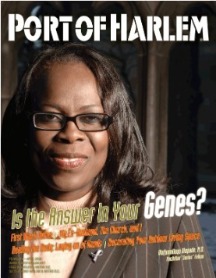In November 2020, Port Of Harlem will celebrate 25 years of publication. As we count down to our birthday, we will republish some of our most popular articles from our print issues. Thanks for subscribing and inviting others to join you in supporting our inclusive, diverse, pan-African publication - - now completely online. We originally published this article in the February - April 2008 print issue.
Less than three years ago, the University of Chicago’s Dr. Olufunmilayo Olopade revealed that doctors are more likely to diagnose women of African ancestry from Nigeria, Senegal, and North America with a more deadly form of breast cancer than women of European ancestry. Using race as a tool to investigate and detect the disease, Olopade’s study discovered answers that altered the way doctors treat Black women with breast cancer at home and abroad.
Also in 2005, BiDil became the first drug the United States government approved specifically for Black people. Meanwhile, researchers in suburban Chicago concluded that high rates of hypertension among African-Americans might have more to do with lifestyle than race.
Using race in the practice of medicine often reinforces old prejudices about biological differences among socially-defined people or that scientifically defined races even exist - - concepts that University of Maryland medical anthropologist Fatima Jackson finds ludicrous. “Race is a sociological and cultural construct and is far too ambiguous biologically to be genetic. In other words, you will not find a single genetic trait within a so-called "race" that is found 100% within the "race" and 0% outside of the "race,” Jackson says.
Is the Answer in Your Genes? An Interview with Dr. Olufunmilayo Olopadeh

While using race as a medical tool remains controversial, Olopade says that the medically important issue is not race itself but the predisposing genes that follow racial patterns. The most difficult questions adds Olopade is how much of the "answer" is in the genes and how much is in the environment. “Most diseases have both genetic and environmental components, and of course the genes and the environment interact with each other in complicated ways; for instance, certain kinds of stress may activate certain genes. This is something that we need to understand for breast cancer and for all complex disorders,” she continued.
Her discovery started on one of her biennial vacations to her birth country, Nigeria. In 1997, she began working with breast surgeon Dr. Adebarnowo at the University of Ibadan, her alma mater, by collecting and studying data on Nigerian women with breast cancer. (Olopade is continuing the study in the United States to further document the link between Black women at home and abroad.) The Nigerian study led to three crucial findings:
Read More
ER-negative Breast Cancer Tumors - A Middle Passage Survivor
Black women are less likely to get breast cancer than White women, but are more likely to get the disease when they are young and are much more likely to die from it. These facts puzzled Olopade and led to her groundbreaking Pan-African study.Her discovery started on one of her biennial vacations to her birth country, Nigeria. In 1997, she began working with breast surgeon Dr. Adebarnowo at the University of Ibadan, her alma mater, by collecting and studying data on Nigerian women with breast cancer. (Olopade is continuing the study in the United States to further document the link between Black women at home and abroad.) The Nigerian study led to three crucial findings:
Read More
Advertisers | Contact Us | Events | Links | Media Kit | Our Company | Payments Pier
Press Room | Print Cover Stories Archives | Electronic Issues and Talk Radio Archives | Writer's Guidelines






